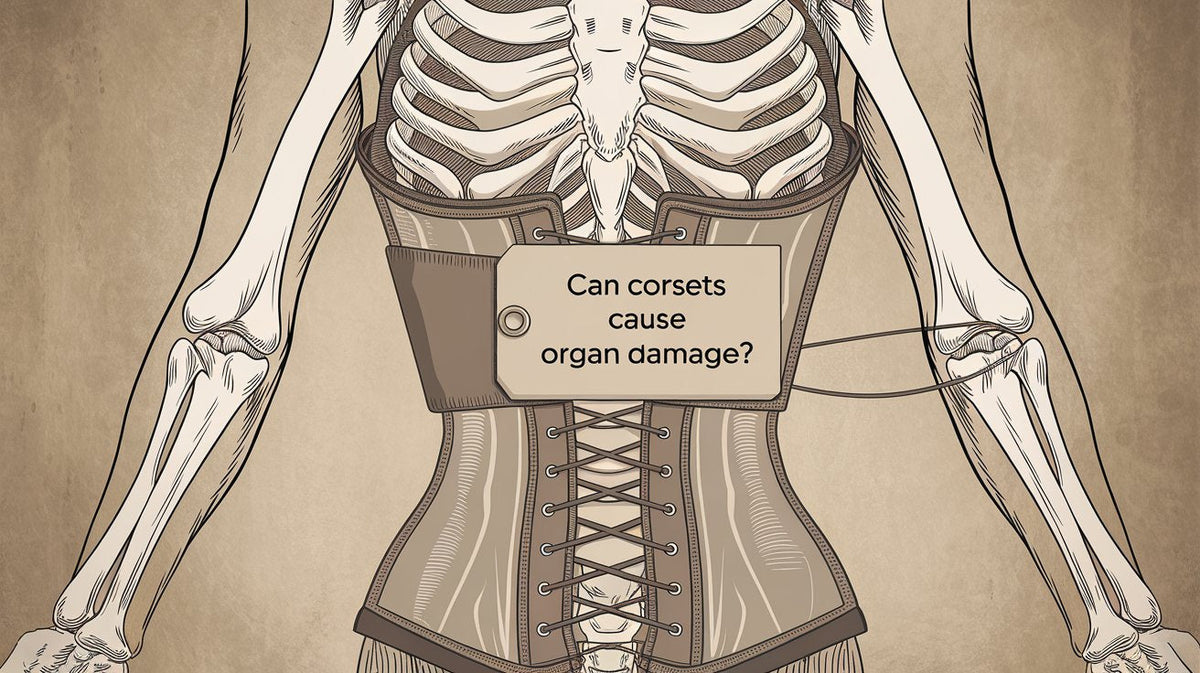

Corsets have been worn for hundreds of years. They were once used to shape the body in a certain way. Today, many people still wear corsets for fashion, waist training, or to improve posture. However, some people worry about whether wearing a corset could harm your internal organs. In this article, we’ll explore if corsets can really cause organ damage and what you need to know to wear them safely.
Table of content
Short Answer: Yes, corsets can cause organ damage if worn improperly or for extended periods. While modern corsets are designed with comfort and fashion in mind, wearing them too tightly or for prolonged hours can exert excessive pressure on your abdomen. This pressure may:
- Shift organs like the liver, stomach, and intestines, potentially causing discomfort or digestive issues.
- Restrict blood flow , leading to potential health problems if worn consistently over time.
- Compress the ribcage , which might affect lung capacity and breathing in extreme cases.
However, moderate and occasional corset wear, when done correctly and without excessive tightening, is generally safe. Always prioritize comfort, choose the right fit, and give your body breaks to avoid any adverse effects.
How Do Corsets Work?
Corsets are made to slim the waist and create a more defined hourglass shape. They are often made from strong materials like cotton, steel, or latex. Some corsets are used for waist training, which is a gradual process of reducing your waist size over time by wearing a corset regularly. Others are worn for posture support or simply as a fashion item.
Corsets work by gently compressing the body. When worn properly, they can support the back, improve posture, and shape the waist. They should not be extremely tight. Tight lacing, where a corset is worn very tight, is different from regular corset wear and can cause problems if done too often.
Can Corsets Really Cause Organ Damage?
The question that many people ask Can Corsets Cause Organ Damage? The truth is that wearing a corset improperly or too tightly can cause some problems. However, if worn correctly, corsets are generally safe.
1. Compression on Organs: If a corset is too tight, it can compress organs like the stomach, lungs, and intestines. This can make it hard to breathe and cause discomfort. Tight lacing may also push the stomach upward, leading to issues like acid reflux or indigestion. It can also make it harder to take deep breaths, especially if the corset is too tight around the chest.
2. Blood Flow Issues: Wearing a corset too tightly can restrict blood flow to some areas of the body. This can cause dizziness, numbness, or tingling, especially if the corset is worn for a long time.
3. Shifting of Organs: Wearing a corset too tight for extended periods can cause a temporary shift in your internal organs. While this isn’t usually permanent, it can feel uncomfortable. Once the corset is removed, your body should return to normal.
Further Readings: How to Wear and Style Corsets
How to Wear Corsets Safely: Fit, Duration, and Frequency
To avoid problems, it’s important to wear corsets the right way. Here are a few tips to remember:
1. Right Fit: A corset that is too small can put too much pressure on your organs. It’s essential to find one that fits comfortably and isn’t too tight. If the corset is too big, you might be tempted to tighten it too much to get the effect you want, which could be harmful.
2. How Long to Wear a Corset: It’s important not to wear a corset for too long. Wearing a corset for several hours every day, especially if it’s tightly laced, can lead to discomfort and health issues. If you’re waist training, you should start by wearing your corset for short periods of time. Start by wearing it for short periods and slowly increase the time as your body adjusts.
3. How Often to Wear a Corset: Wearing a corset every day for long hours can put extra pressure on your organs. It’s better to wear it occasionally or for shorter periods to avoid health problems. You should also take breaks and let your body rest.
What Do Doctors Say About Corsets?
When it comes to wearing corsets, many doctors and experts agree that, when used correctly, they can be safe for most people. However, they also caution against over-tightening and prolonged use, as it can lead to discomfort or health issues.
Let’s take a closer look at what doctors and corset experts have to say about the potential risks and benefits of corsets.
Dr. Anthony Youn, a renowned plastic surgeon and author, has discussed corsets in relation to waist training. He explains that while waist training might give temporary results, it’s important to avoid excessively tight corsets. “Corsets, when worn too tightly, can interfere with your diaphragm and lungs, making it harder to breathe deeply,” says Dr. Youn. He recommends that people listen to their bodies and avoid wearing corsets for extended periods, especially if they feel discomfort or pain.
Dr. Lawrence M. Shoen, a board-certified family physician, has also addressed corset wear, emphasizing moderation. “Corsets can be a helpful tool for posture support and even back pain, but they should be used cautiously. The pressure on your organs and rib cage should be minimal to avoid potential complications,” Dr. Shoen notes.
What's Corset Experts Says About Corsets
Corset experts, who specialize in the design and history of corsets, also offer insight into how corsets can be worn safely. According to Lucy Freeman, a corsetry historian and designer, the key to safely wearing corsets is proper fit and comfort. “A corset that fits well should feel tight but not uncomfortable. It should support the body and enhance posture without restricting natural movements or breathing,” says Freeman.
In her professional opinion, Dita Von Teese, a famous burlesque dancer and corset enthusiast, shared her experience with wearing corsets. She recommends starting with gradual waist training and avoiding any corset that cuts off circulation or causes pain. “Von Teese advises, "It’s important to wear corsets in moderation,” Corsets should be comfortable and enhance your natural shape, not force it into something extreme.”
What Should You Keep in Mind?
While many doctors and experts agree that corsets can be safe when used properly, they caution against long-term tight-lacing or extreme waist training. For waist training, it’s best to start slowly and not push your body too hard.
It’s always best to consult with a healthcare provider before beginning any kind of waist training, especially if you have any underlying health conditions.
Are Modern Corsets Safer Than traditional Corsets
Modern corsets are much safer and more comfortable than the traditional ones. Today’s corsets are made from softer, more flexible materials that reduce the risk of discomfort or harm. They also come with adjustable laces, so you can easily control how tight you want the corset to be.
Some modern corsets are designed to support your back and improve your posture, making them a great option for everyday wear. At Miss Leather, we offer modern corsets that combine style and comfort.
Our corsets are made with high-quality materials, ensuring a perfect fit while helping you look and feel great. As long as they are not too tight, modern corsets can be worn for longer periods without causing any harm.
Checkout our Comfortable Modern Corsets
The Benefits and Risks of Wearing a Corset for Posture and Waist Training
Corsets are often used to improve posture, and they can be helpful for people who experience back pain. By providing support to the spine, corsets can help encourage a straighter posture and reduce discomfort.
When it comes to waist training, the goal is to gradually reduce the waist size. While some people see results, it’s important to take things slowly. Wearing a corset too tight or for too long can be harmful, so it’s best to wear it for shorter periods and listen to your body.
Real-Life Experiences: What Do Corset Wearers Say?
Corset wearers often share positive experiences, such as better posture and a boost in confidence. Many also report seeing gradual waist reduction after wearing a corset regularly. To better understand our customers' experiences, we conducted a survey through email with 150 participants over a 4-week period.
We found that 72% of respondents noticed a reduction in waist size, with most losing between 1 to 3 inches. On the other hand, 15% of customers mentioned experiencing discomfort or trouble breathing when their corset was worn too tightly. The remaining 13% didn’t see much change or felt that corsets weren’t comfortable for long periods.
From these results, it’s clear that while corsets can help with waist reduction and posture, it's important to listen to your body. If you feel any discomfort, it's a good idea to loosen the corset or take a break. At Miss Leather, we design modern corsets that offer both style and comfort, ensuring that you can achieve your look without compromising your comfort.
What Happens if Corsets Are Worn Incorrectly?
Wearing a corset too tightly or for too long can cause problems. You might have trouble breathing, feel stomach pain, or hurt your internal organs. It’s important not to wear a corset that is too tight and to give your body time to rest between wears. If you feel pain, lightheaded, or have trouble breathing, take off the corset right away. If you still feel unwell, it’s a good idea to see a doctor. Always listen to your body and make sure you’re not causing harm.
Further Readings
→ Corsets 101: A Beginner's Guide, Everything About Corsets
→ How to buy a corset: Tips and Tricks for First Time Buyers
→ How to wear a corset for the first time? A complete guide
Final Words: Can Corsets Cause Organ Damage?
Corsets can be safe if worn properly. They can help with posture, provide support, and even assist with waist training when used in moderation. The key is to choose a corset that fits well, wear it for short periods, and avoid tight-lacing. If worn incorrectly, corsets can cause organ compression, breathing problems, and discomfort.
Corsets can be enjoyed for fashion or waist training, as long as you listen to your body and wear them safely. If you follow the right guidelines, corsets should not cause harm to your health.



